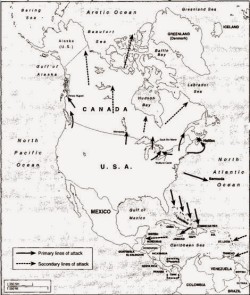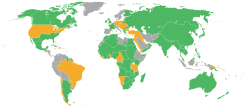 This post includes spoilers of Harry Turtledove’s Southern Victory series, up to the Settling Accounts series. If you’re interested in reading the series, I don’t think that it will ruin the story for you. Turtledove’s storytelling doesn’t particularly lend itself to surprise endings.
This post includes spoilers of Harry Turtledove’s Southern Victory series, up to the Settling Accounts series. If you’re interested in reading the series, I don’t think that it will ruin the story for you. Turtledove’s storytelling doesn’t particularly lend itself to surprise endings.
Vox presents thirteen maps of things that never happened. The one to the left is the first one, which involves plans to invade Canada.
We, of course, have very little reason to ever invade Canada. Our only route to incorporation is this one, and at this juncture they’re probably more likely to take from us than we are from them.
—
Turtledove’s WWI alliances[/caption]I’ve been working my way through Harry Turtledove’s work. Right now I am audioreading his “Atlantis” series (wherein the eastern part of the US broke off from North America to become an island continent). Prior to that, it was his “Southern Victory” series, wherein the south won the Civil War. The books track the alternate timeline from the 1880’s to World War I and now* the world embarks on World War II (except that Hitler’s got a drawl). The biggest departure is history, apart from a dramatically weaker United States, is that it changed the course of history in World War I. In short, the United States and Germany emerged victorious over the CSA, Britain, and France.With Canada being a part of the UK, of course, they were also among the losers. The biggest losers, in that by the end Canada ceased to exist. With the exception of Quebec**, it was incorporated into the United States. Portions of the Confederacy (including but not limited to what we call West Texas, Oklahoma, and Kentucky) were also taken. Due to the political considerations***, Oklahoma (“Sequoia”), West Texas (“Houston”), and Kentucky (“Kentucky”) were granted statehood while the Canadian provinces were not. The novels follow three different Canadian storylines, from the perspective of an American in Ontario, from a Canadian insurgent in Manitoba, and a citizen of the freshly minted Republic of Quebec.
The lesson, on both the Confederate and Canadian fronts, is that occupation is hell. Not just for the occupied, but for the occupiers. And it’s really, really difficult to reconcile with a remotely liberal democracy.
I often wonder to myself how much better off, or worse off, most of Mexico would be if we’d never signed the Guadelupe Hidalgo treaty and marched on Mexico City, and how much better off the Philippines would be if we’d never left. Given the populations of both of those places, though, it would have been next to impossible to stay with a hostile population. We weren’t quite the liberal democracy – at least as far as Mexico is concerned – we were then that we are now (or at least theoretically strive to be), making the whole thing a non-starter. (Points to David Alexander for being the first person to really point this out to me.)
* – The series is complete. Unfortunately, the last four books were never recorded. So I’m having to read them, and I haven’t quite gotten to them yet.
** – It was rather a stroke of genius on Teddy Roosevelt’s part. The US was ill-equipped for a Francophone state. And negotiating an independent Quebec made an immediate ally in separating Canada. The confederacy probably would have been better equipped for incorporating Quebec, as it (ironically) had more of a multicultural streak and a system that could incorporate such. Not only did they have the primary Spanish-speaking states of Sonora, Chihuahua, and Cuba, but they had a comparatively benign policy towards Native Americans, leaving them to govern Sequoia (Oklahoma). They also would have been better positioned to avoid the conflicts with Utah if they had been so inclined, though the Confederacy evidently had a particular disdain for the Mormons.
*** – The two parties are the Democrats and the Socialists, with Republicans being little more than an afterthought. Teddy Roosevelt, a Democrat, knew that the Canadian provinces would likely vote Socialist. Further, there was more of an impetus to try to solidify their holdings on the former Confederate states to strengthen the hand of those who did not want to return to the Confederacy. Though solidifying the Americanness of the Canadians also may have been wise policy, it was less urgent because they had no nearby country to return to.
About the Author
please enter your email address on this page.

